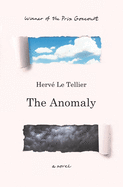
The Anomaly is an ambitious, unclassifiable novel from Hervé Le Tellier, centered around a philosophical puzzle while dabbling in the page-turning realm of thrillers, science fiction and more. It won France's prestigious Prix Goncourt, and is perfectly suited for an English-language release, thanks to its globe-spanning cast of characters and wide-ranging satire, which takes aim at a thinly disguised former president, among others. The events of the novel are set in motion when a Paris-New York flight arrives for seemingly the second time, resulting in two identical sets of passengers. Naturally, this provokes a top-secret emergency as governments and scientists scramble to reckon with what this duplicated flight could mean, while the passengers face the frightening implications of their own doubles. Le Tellier explores the concept of doppelgangers in the grand tradition of Edgar Allan Poe and Dostoevsky, as a way for his characters to encounter themselves, to reconsider their lives and their sense of identity.
The novel quickly introduces us first to Blake, a contract killer, with the line: "Killing someone doesn't mean a thing." The Anomaly thus seems to begin in the mode of a thriller, following Blake as he stalks and kills his targets for money. This introduction is indicative of how Le Tellier uses his highly varied characters to explore different genres. We soon meet probabilities expert Adrian Miller, who was responsible for developing protocols for government responses to a variety of disasters, including one that he never expected to be used: protocol 42. Soon, he is summoned to be part of the government response to the duplicated planes and their passengers, taking the novel into the realm of science fiction as he seeks to explain how something like this could have happened. Other characters have much more grounded concerns, including Slimboy, a Nigerian musician hiding the potentially dangerous truth of his homosexuality, and Joanna, a Black American lawyer caught up in an ethical web. Le Tellier uses these characters to swap and meld genres, approaching his premise from a variety of angles. This variation in tone and approach keeps the novel feeling fresh and unpredictable in ways reminiscent of books like David Mitchell's Cloud Atlas, which also seeks to look at common human problems from the complementary viewpoints of wildly different people.
The titular anomaly poses both personal and metaphysical problems for Le Tellier's characters. The duplicate flight arrives months after the first, meaning that the first set of passengers have moved on with their lives in the interim, sometimes reaching crisis points or even dying. One newly arrived version of a character can be briefed on the cancer that his other self discovered too late; another, an author, learns that his doppelganger committed suicide after writing a despairing book that became a postmortem phenomenon. Things are even more complicated for those whose doppelgangers are still living, as they must decide how to parcel out their lives and their jobs, figure out relationships with non-duplicated significant others and, in the case of the contract killer, deal gruesomely with his equally dangerous doppelganger. Meeting one's double also serves as a disturbing look in the mirror for many characters who find themselves morally troubled or disappointed with their lives.
Le Tellier focuses on his characters' personal problems while also zooming out to look at the effects the anomaly has on a global scale. The crass ways in which a metaphysical problem is translated into politics provides a prime opportunity for satire, as does the idea of complex scientific concepts like wormholes having to be explained to an unnamed U.S. president who is not difficult to identify: "The American President sits open-mouthed, showing a marked resemblance to a fat grouper with a blond wig." The novel excels at juxtaposing high and low, situating thinly veiled insults at "The American President" with heady discussions of real, contentious science and philosophy. A roundtable with religious leaders, for example, threatens to devolve into farce and name-calling as their internecine conflicts and orthodoxies get in the way of discussing what the anomaly means for concepts like the soul. The scientists charged with figuring out the most likely explanation for the anomaly come to an unnerving conclusion, the majority deciding that the anomaly is explicable only if the universe exists inside a computer simulation--a controversial, much-debated idea in our real, non-anomaly world.
The Anomaly does not seek to provide answers to these questions, but to multiply the questions endlessly, challenging readers' understanding of their own lives alongside the characters in the book. As well as an entertaining narrative, Le Tellier has gifted us with a surprisingly detailed thought experiment, one that playfully undermines and puts into question all the basic institutions and assumptions undergirding contemporary life. --Hank Stephenson

